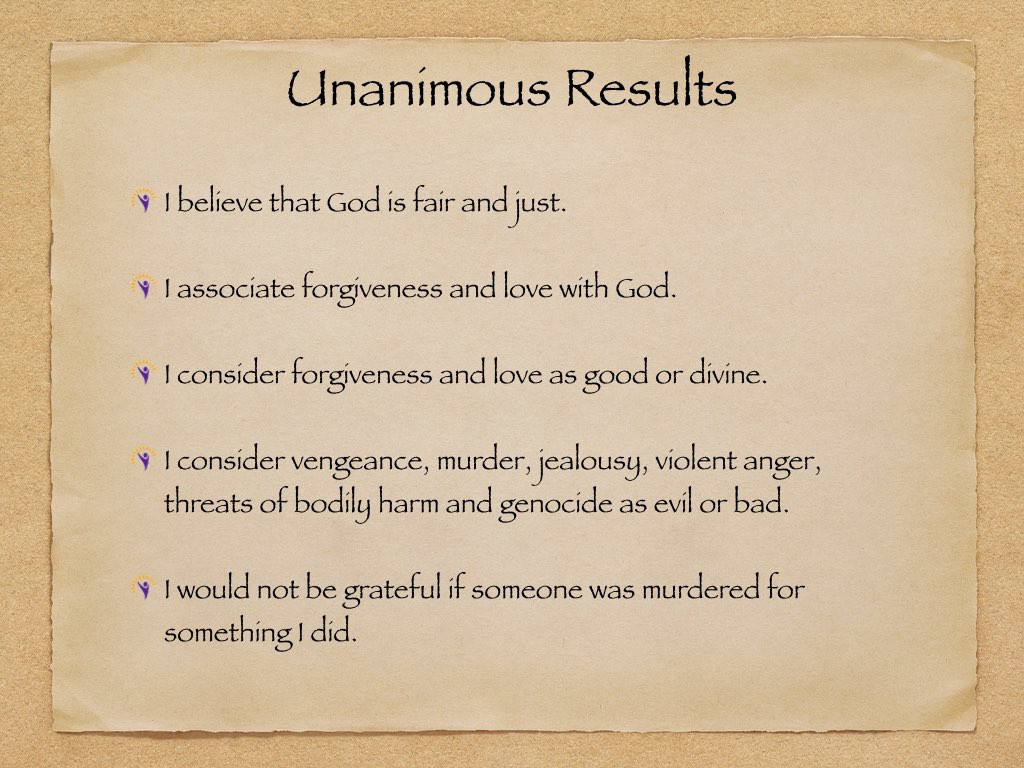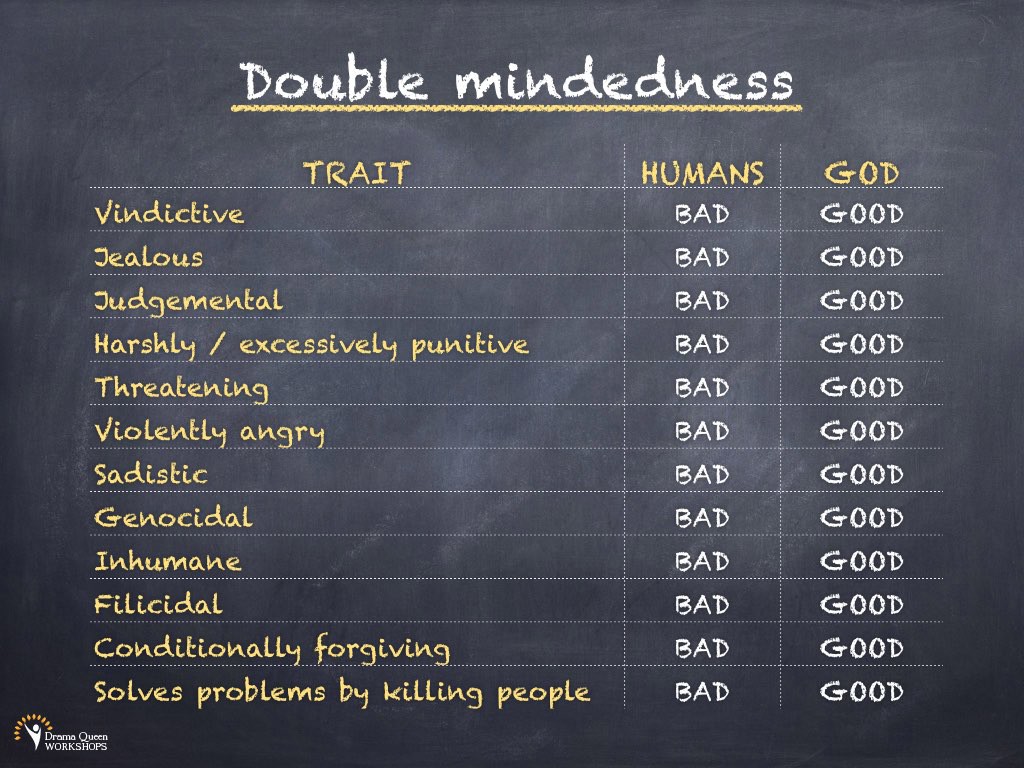 Sooooo, did you take my “double minded” quiz? Well, I hope you enjoyed the little gift that I tucked inside for you: a piece of sweet self discovery. Actually, whether or not you answered the questions, the gift was yours for the taking.
Sooooo, did you take my “double minded” quiz? Well, I hope you enjoyed the little gift that I tucked inside for you: a piece of sweet self discovery. Actually, whether or not you answered the questions, the gift was yours for the taking.
I structured the quiz to be a treat for everyone. There were no right or wrong answers. And even if you didn’t answer the questions online, you still got the goodies: The opportunity to think about your beliefs—and the implications of your beliefs.
It is no small thing that most of the post readers did not answer the quiz online, and most who started the quiz did not answer all ten questions. My guess is that they realized that their answers to the later questions would conflict with their previous answers, so they stopped.
The fact that the questions tripped the “double minded” alarm 99% of the time was a shock, I will admit. But what terrific insight it provided to each reader. It gave them pause. They pondered their dilemma, then realized that their beliefs contradicted each other. Hallelujah!
Believing does not make it so
As I’ve frequently said, my intent is not to change your beliefs or tell you what to believe. I simply want to encourage you to think before believing. If you can suspend your belief until you have proof that something is true, even better.
This unscientific “double minded” quiz results reveal that you did just that. That’s not only encouraging, it’s very exciting. You have renewed my hope for functioning human brains, a hope that is dashed every time I visit one of my social media accounts and see a meme that asks people to say, “Amen.”
My heart falls every time someone adds, “…if you love God” to the amen command. For these people, God is all about the guilt-trip. And millions are willing and eager to take that trip—as long as they don’t have to think first.
Moses, meet Jesus
 Here’s a classic: a meme I just spotted on Pinterest a minute ago. It’s positioned as a Bible verse, “Jesus will never leave me nor forsake me,” and cites Deuteronomy 31:8 as its source.
Here’s a classic: a meme I just spotted on Pinterest a minute ago. It’s positioned as a Bible verse, “Jesus will never leave me nor forsake me,” and cites Deuteronomy 31:8 as its source.
That was jaw-dropping enough. But I almost fell out of my chair when I read the first comment: #Jesus. I kid you not. This commenter said, “#Jesus.” Ha’ mercy!
Like so many other social media commenters who are eager to be publicly pious and globally accepted as one Jesus’s peeps, this woman overlooked one important fact: Deuteronomy is in the Torah; it’s the fifth book of the OLD Testament.
Moses is allegedly the voice in these books. Miracle o’ miracles, Moses seems to have narrated his own death in Deuteronomy (a topic for another conversation); but he never mentioned Jesus by his current name, or as Yeshua, his correct name. Anyone who has even casually read these Hebrew scriptures is aware of this.
Everyone who reposted this misleading (and arguably, fraudulent) meme unwittingly paraded their gullibility before the world: They leaped before they looked. They affirmed before they knew. They believed before they thought. They certainly didn’t heed Jesus’s warning: “Beware of practicing your piety before others in order to be seen by them” (Mt. 6:1)
Oh yeah, and they outed their ignorance of scripture. Never mind the facts. It was more important to be seen in the “Amen Choir” loft, just in case God is scrolling Pinterest or Facebook pages. (Don’t you love the posts that proclaim that God is going to give you a blessing if you make an affirmative comment or share it on your timeline?)
There is a cure for all of this, and it’s found in one of the first parables attributed to Jesus. That would be in the New Testament, by the way.
Double minded thinking. There’s an ancient app for that.
In the second chapter of Mark (2:22, to be precise), the world’s most famous rabbi is reported as saying, “Neither do people pour new wine into old wineskins. If they do, the skins will burst; the wine will run out and the wineskins will be ruined. No, they pour new wine into new wineskins, and both are preserved.” Mark, the oldest but not first gospel recorded this admonition in the second chapter of his book. Matthew and Luke, who copied large swaths of Mark verbatim during this pre-plagiarism period, included this parable in their books (Mt 9:14-17 and Luke 5:33-39).
It also appears in the Gnostic Gospel of Thomas (Saying #47), which could signal something significant, and certainly adds credibility. Thomas is said to have walked with Jesus. By contrast, Bible historians say that the Matthew, Mark and Luke who wrote the gospels were not his disciples. They did not know him; in fact, they weren’t even Jesus’s contemporaries.
Matthew, Mark and Luke’s texts don’t agree on Jesus’s birth or death narratives; but they definitely agree on this parable. Why is it so important?
The basic idea here is that if new thoughts, ideas and practices are incompatible with old ones, they can’t occupy the same space in our heads. You can’t pile the new on top of the old. The new one has to replace the old; otherwise, we will make a mess. We will become double minded and confused.
 What Jesus was specifically referring to in this parable was religious tradition and rituals that he felt held no value.
What Jesus was specifically referring to in this parable was religious tradition and rituals that he felt held no value.
The same held true for the Old Testament god worshiped by the Hebrews: This was a violently angry, jealous, vengeful, excessively punitive and genocidal god who had little regard for human life. He even commanded humans to do things to each other that they would not want done to themselves. That god bore no resemblance to the god of whom Jesus spoke.
But that was the only god that the Jewish people had known for generations. To combine this new image of a powerful god that Jesus was introducing—a god who was more like the unconditionally loving and forgiving father of prodigals—with the old image of a forceful, mean-spirited god was a volatile mix. God would be diagnosed as bi-polar, and the holder of this inconsistent and contradictory image would be diagnosed as…well, double minded, as we learned in the quiz.
What we learned about ourselves
To say that the results were insightful would be an understatement. Some of us took a serious look at the beliefs in our heads for the very first time.
Without dwelling on the numbers, let’s take a look at our answers, starting with our unanimous beliefs. Note: These results were from the first ten days that the quiz was open.

While we didn’t completely agree on other questions, the majority agreed that…
- God is good/divine. (95%)
- We should do everything the Bible tells us to do. (59%)
- It would be unfair to blame us for someone else’s wrongdoing. (95%)
- Jesus died on the cross because God loves us. (65%)
- God’s behavior is not portrayed accurately in the Bible. (63%)
The only consistency in these results is the inconsistency. For example, we believe that God is fair and just—but not necessarily good or divine. Many believe that God’s behavior in the Bible is accurately portrayed, but also believe that vengeance, murder, jealousy, violent anger, threats of bodily harm and genocide are evil. Ergo, we actually believe that God’s behavior is evil. We weren’t aware of that before now.
Several results were particularly insightful: We think it’s unfair for us to suffer for someone else’s wrongdoing. But how many of us believe a fair and just God holds us accountable for “original sin”? Mind you, this is a transgression committed by the ancient ancestor of all cave men, none of whom left any evidence of keen intellect and reasoning ability.
In that same vein, we do not believe that an innocent person should be killed for something we did. Oh, but there’s one notable exception: Jesus. A whopping 65% of us believes that God had Jesus sadistically tortured because He loves us so much. Have we asked ourselves: Is that a fair, just or even sane way to demonstrate love? Double mindedness causes us to believe that a behavior that is considered undesirable or bad when a human does it is good when God does it.
The quiz pulled back the curtain to reveal a very common mental conflict. We saw that while we associate God with love and forgiveness, we also believe that God would not forgive us unless Jesus was brutally murdered. An innocent man whom we claim to love was heinously tortured to death, and we discovered that we’re OK with that. In fact, we’re even grateful. We weren’t able to see the conflict because of the previously mentioned combo of old and new wine making a mess in our heads.
Eyes wide shut
I hope this has been an adventure of self discovery for you, an opportunity to be consciously aware of your beliefs, and what they really mean. Our beliefs influence our behaviors; so it’s important to have an intimate understanding of what compels us to act. It’s important to know whether our beliefs align with our values.
 Again, I’m not suggesting that you change your beliefs. I’m suggesting that you shake their hand and get to know them. Connect some dots.
Again, I’m not suggesting that you change your beliefs. I’m suggesting that you shake their hand and get to know them. Connect some dots.
For example, if we believe that God is fair, and we don’t think it’s fair for us to pay the price for someone else’s crimes—or for an innocent person to suffer for ours—are our values consistent with our embrace of Jesus’s brutal murder? By expressing gratitude for this act and “washing” ourselves in his blood, have we exempted Jesus from fair treatment.
And have we implicated God in an act of unfairness? By embracing this version of the story, aren’t we worshiping someone who treats others unfairly and solves problems by sadistically killing people? Aren’t we holding humans to a higher standard of behavior than the god we worship? Is it possible that the Bible scribes are describing their god and not ours?
Something to think about, as we also gain a better understanding of why James would proclaim that a double minded man is unstable in all his ways.
Much love to you!

